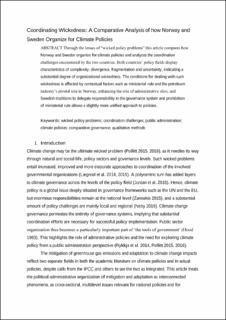| dc.contributor.author | Neby, Simon | |
| dc.contributor.author | Zannakis, Mathias | |
| dc.date.accessioned | 2021-02-04T11:53:21Z | |
| dc.date.available | 2021-02-04T11:53:21Z | |
| dc.date.created | 2021-01-26T11:15:57Z | |
| dc.date.issued | 2020 | |
| dc.identifier.citation | Journal of Comparative Policy Analysis. 2020, 22 (6), 593-611. | |
| dc.identifier.issn | 1387-6988 | |
| dc.identifier.uri | https://hdl.handle.net/11250/2726147 | |
| dc.description.abstract | Through the lenses of “wicked policy problems” this article compares how Norway and Sweden organize for climate policies and analyzes the coordination challenges encountered by the two countries. Both countries’ policy fields display characteristics of complexity, divergence, fragmentation and uncertainty, indicating a substantial degree of organizational wickedness. The conditions for dealing with such wickedness is affected by contextual factors such as ministerial rule and the petroleum industry’s pivotal role in Norway, enhancing the role of administrative silos; and Swedish traditions to delegate responsibility in the governance system and prohibition of ministerial rule allows a slightly more unified approach to policies. | |
| dc.language.iso | eng | |
| dc.rights | CC BY-NC-ND 4.0 | |
| dc.rights.uri | https://creativecommons.org/licenses/by-nc-nd/4.0/ | |
| dc.title | Coordinating wickedness: a comparative analysis of how Norway and Sweden organize for climate policies | |
| dc.type | Peer reviewed | |
| dc.type | Journal article | |
| dc.rights.holder | © 2020, Authors | |
| dc.description.version | acceptedVersion | |
| cristin.ispublished | true | |
| cristin.fulltext | postprint | |
| cristin.qualitycode | 1 | |
| dc.identifier.doi | https://doi.org/10.1080/13876988.2020.1821362 | |
| dc.identifier.cristin | 1879439 | |
| dc.source.journal | Journal of Comparative Policy Analysis | |
| dc.source.volume | 22 | |
| dc.source.issue | 6 | |
| dc.source.pagenumber | 593-611 | |

